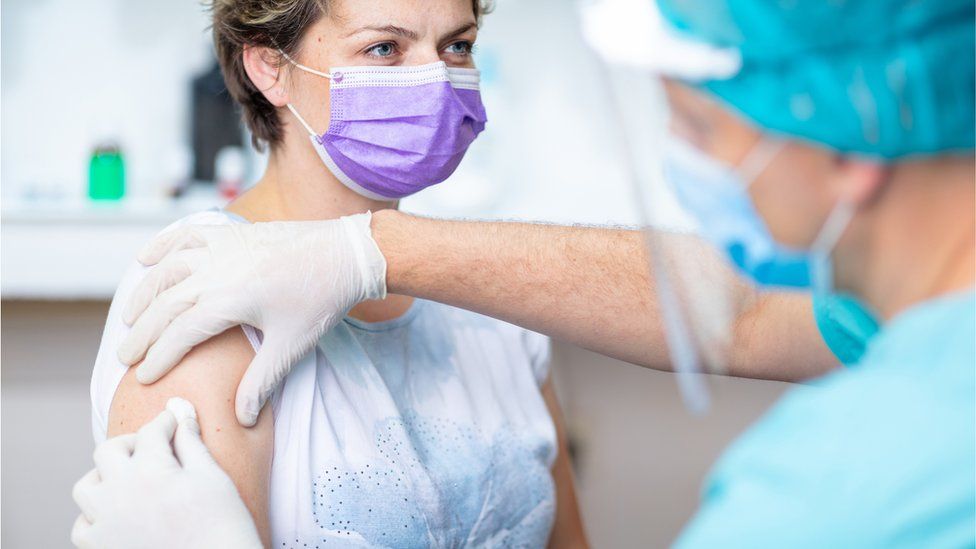Flu jab waits and delays amid high demand
- Published
- comments

Some GPs and pharmacies have run out of flu jabs and are asking people to wait until more stock can be delivered.
Boots says it has seen very high demand for the vaccine and has now had to suspend bookings.
Government officials say there is no national shortage and there will be enough doses in the coming weeks and months to vaccinate the 30 million people deemed most vulnerable to flu.
Available stocks are being given to the over-65s and high risk groups.
Once those groups have been immunised, healthy 50 to 64-year-olds in England will, for the first time, be eligible for a free flu jab on the NHS. This is to help protect against the double threat of flu and coronavirus this winter - research shows people can catch both diseases at the same time, with serious and sometimes deadly consequences. There is currently no vaccine for coronavirus.
Boots pharmacy said it had increased its order of flu jabs by around a fifth in anticipation of a very busy period, but the level of demand it had seen in the last few weeks was unprecedented.
Flu vaccine ordering is done many months in advance of the flu season and the delivery is phased over the autumn and into winter.
Head of the Royal College of GPs Prof Martin Marshall urged people to "sit tight" and stressed it was important that all those eligible for the flu jab came forward when told to do so.
Dr Mary Ramsay, head of immunisation at Public Health England, said: "It is usual for manufacturers to stagger deliveries of the vaccine. Every year, there is a phased roll-out and vaccinations continue throughout the autumn. Some GP practices and pharmacies may ask people to wait until they receive further deliveries."
Helen Concilia from Seqirus, the company that supplies the type of flu vaccine used to immunise over 65s, said: "We can confirm that there is no supply issue."
Jessica Kirby, Head of Health Advice at Asthma UK and the British Lung Foundation, said: "We'd urge people who are unable to book via their pharmacy or GP at this stage not to give up and to keep trying. Flu season lasts until spring, so whilst we'd encourage vaccination as early as possible, there is still time."
This year, the free vaccination is being offered in England to:
- people who were required to shield from coronavirus and anyone they live with
- people with some medical conditions including diabetes, heart failure and asthma
- pregnant women
- pre-school children over the age of two
- all primary school children, as last year, and, for the first time, Year 7 pupils
- initially all people over 65, before the programme is extended to the over-50s
- healthcare and social care staff
- people living in a residential or nursing home
- people who are the main carer for an elderly or disabled person
The NHS will get in contact with those who are eligible.
Flu, like coronavirus, is a viral infection that is passed on through coughs and sneezes. Social distancing, masks and hand-washing should help reduce the spread.
Most people with flu recover at home in a week, but people with chronic conditions or who are over 65 should call NHS 111.
Anyone who thinks they have either flu or Covid-19 should stay at home and self-isolate.
People should book a coronavirus test if they have:
- a high fever
- a new, continuous cough
- a loss of, or a change to their sense of smell or taste
- Published22 September 2020
- Published2 November 2022
- Published24 September 2020